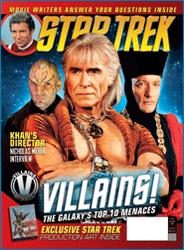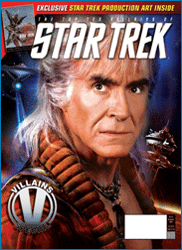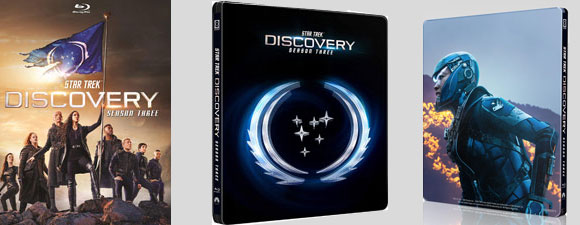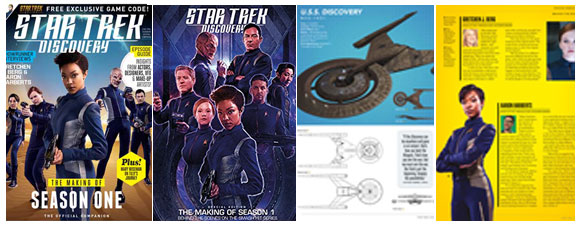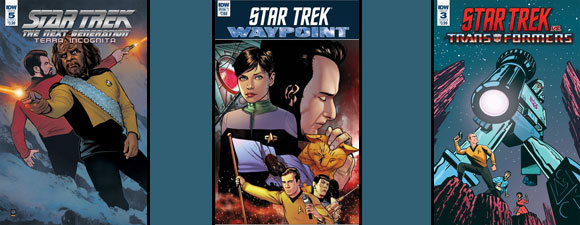Star Trek Magazine Preview
4 min read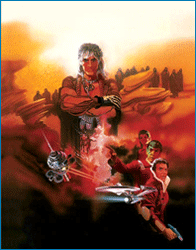
Star Trek Magazine issue #22 is on sale now, and included in this issue are the top ten Star Trek villains.
Most fans can easily name their favorite Star Trek villains, but just what makes a good Star Trek villain? In Star Trek Magazine, Lance Parkin examines the effects of Star Trek: The Wrath of Khan on the rest of the franchise.
“The movies have tended to have stronger, or at least more blatant, villains than the television series, and the reason for that can be summed up in one word: “Khaaaaaannnn!!!!” writes Parkin. “The second season episode Space Seed and its movie sequel Star Trek II: The Wrath of Khan presented the show with a rare super-villain. Khan is a warrior scientist; a futurist visionary from the unenlightened past; a man of passion and cold strategies. Movies can’t be as sedentary as some television episodes, much of Star Trek: The Next Generation and Star Trek: Enterprise seems to consist of characters sat around a table explaining to each other what we all just watched in the last ten minutes. They need more pace, more of an impetus to action. More action.”
“Nowadays, the movies tend to have one guy who’s a little bit insane, has a personal grudge against the captain (or Spock, in a couple of cases), and has access to some new technology that he’s managed to weaponize,” Parkin added. ” In the grand super-villain tradition, he tends to have a secret origin story that involved him being a normal, even unremarkable individual who suffered some great personal tragedy. He tortures people. Whereas loyalty to Kirk or Picard by his crew is almost always seen as affirmation of how wonderful our captains are, those loyal to the villain are invariably portrayed as paid mercenaries, dupes, cowed, weak-minded ‘followers’ or victims of his hypnotic or mind control powers.”
“Pitting a charismatic villain against our hero worked in The Wrath of Khan, and it’s only natural that the makers of Star Trek have tried to recapture that a number of times since. They’ve been egged on by fans who’ve come to see The Wrath of Khan as a template for Star Trek rather than, as it was at the time, a pretty systematic rejection of what Star Trek had been to that point.”
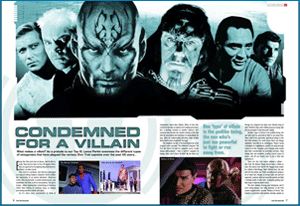
And speaking of Khan, the greatest Star Trek villain of them all, Star Trek: The Wrath of Khan Director Nicholas Meyer talks about the super villain. Meyer was asked if he ever regretted that there wasn’t a physical confrontation between Khan and Kirk in The Wrath of Khan. “No. I never gave it a thought,” he said. “I know that Bill Shatner did. I thought it was cheesy. I can point to a number of films, and a number of real life events, in which the protagonist and the antagonist never meet. It did not concern me over much. I guess I thought that that kind of confrontation with these two people, being gladiators, would be cheesy, stereotyped and familiar.”
Meyer went on to explain what he did regret. “If there’s a regret that I have, which I didn’t have for the first twenty years and then somebody pointed it out to me, and I thought, ‘There’s an interesting missed moment,’ it’s that Khan never sees Kirk get away. He goes to his death believing that he has succeeded. I wonder, if I’d thought of it, would I have?”
“I have some ambivalence about taking it away from him, but it’s very interesting that we didn’t even think of it. You play that moment earlier when he realizes that there is no override, and they can’t do anything about raising the shields. That look of consternation, how different would that have been from his look at the end? Other than the man who goes to his death believing that he’s avenged his wife.”
Did Meyer have any idea that Khan would resonate for so long? “Truthfully I can’t say that I predicted anything like his preeminence, or anything like the stature which has been accorded this movie as a total construct,” said Meyer. “Never.”
“I did know as I was watching Montalban in his first scenes in the cargo bays that I was watching a very great actor, and I had had no idea. I remember thinking, as I watched him and he was breaking my heart, that he should play Lear. He made some self-deprecating comment about his accent, which I remember thinking was completely irrelevant. Notwithstanding any Hispanic inflection, his enunciation, his articulation was perfect. That’s as close as I came to realizing that Khan had a kind of Lear-like grandeur when played by this guy. The arrogance and the pain walked hand in hand.”
“Montalban was not typically an angry guy, not, as some actors, a ‘squawky bird.’ He was a gentleman of a rather old-school cut. Humorous, generous, very smart in a kind of intuitive way.”
